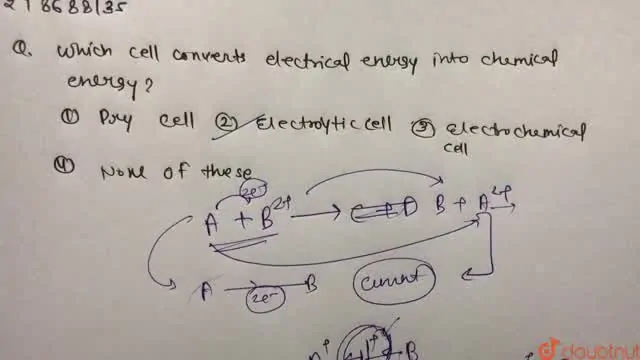Which cell converts electrical energy into chemical energy ?
Dry cell
Electrolytic cell
Electrochemical cell
None of these
The correct Answer is:B
Step by step video, text & image solution for Which cell converts electrical energy into chemical energy ? by Chemistry experts to help you in doubts & scoring excellent marks in Class 12 exams.
Related Playlists
Similar Questions
Which cell convert electrical energy into chemical energy ?
View SolutionWhich of the following statements are correct ?
(i) An electric circuit must be opened for current to flow through it .
(ii) A dry cell converts electrical energy into chemical energy .
(iii) Electric current always flows from positive to the negative terminal of the cell through the circuit .
(iv) Pure water does not conduct electricity .View SolutionA motor converts electrical energy into
View SolutionName the device which converts electrical energy into mechanical energy.
View SolutionName the device which converts electrical energy into mechanical energy.
View SolutionAnswer true or false.
A cell or battery converts electric energy into chemical energyView SolutionWhich of the following devices does not convert electrical energy into mechanical energy ?
View SolutionWhich device converts chemical energy into electrical energy?
View SolutionA generator converts
A. mechanical energy into electrical energy.
B. electrical energy into chemical energy.
C. thermal energy into electrical energy.
D. electrical energy into light energy.View SolutionA generator converts
A. mechanical energy into electrical energy.
B. electrical energy into chemical energy.
C. thermal energy into electrical energy.
D. electrical energy into light energy.View Solution


